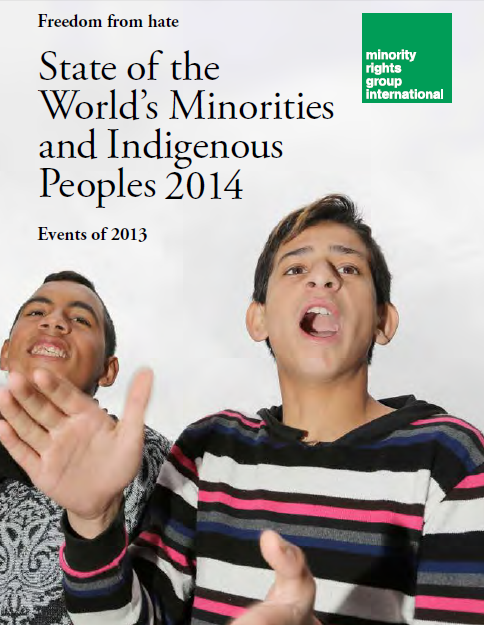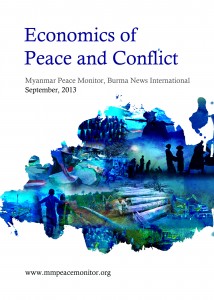Ethnic Nationalities (252 found)
Statement by Political and Community Based Organizations in Kayah State Condemning the Planned Trespassing Charges Against 190 Villagers of Hso Lyah Ku Village in Pruso Township of Kayah State
a) The lands around Hso Lyah Ku village, which have been farmed for generations by the villagers, have been forcibly confiscated by Light Infantry Battalion 531 due to the failure of previous governments to issue title deeds to land owners, and also due to the failure to proceed with registration of the land according to the 2012 Land Law […]
• • •State of the Word’s Minorities and Indigenous Peoples 2014
 Hate crime towards minorities and indigenous peoples is a daily reality across Asia but is often ignored by the governments of the region, Minority Rights Group International (MRG) warns in its annual report. This year’s flagship report, State of the World’s Minorities and Indigenous Peoples 2014, is themed around ‘Freedom from Hate’ and shows that a worrying trend of vilification and hostility towards minorities and indigenous peoples has spread across the region.
Hate crime towards minorities and indigenous peoples is a daily reality across Asia but is often ignored by the governments of the region, Minority Rights Group International (MRG) warns in its annual report. This year’s flagship report, State of the World’s Minorities and Indigenous Peoples 2014, is themed around ‘Freedom from Hate’ and shows that a worrying trend of vilification and hostility towards minorities and indigenous peoples has spread across the region.
A key aspect of hate crime and hate speech is its invisibility, especially when governments or societies overlook or tolerate entrenched patterns of discrimination against particular communities, says MRG. Across Asia, governments have failed to provide adequate protection to its minority and indigenous populations.
“Hate crimes have been able to flourish in Asia largely as a result of the complicity or support of politicians who stand to gain from the persecution of minorities,” says Mark Lattimer, MRG’s Executive Director. “Hate speech goes unchallenged and crimes are often under-acknowledged and under-reported, enabling perpetrators to operate with impunity.” […]
• • •Joint Statement of Concern by Shan Civil Society Organizations Regarding Public Meeting by Burmese Government and Hydrochina to Promote Dams on the Salween and Nam Ma Rivers
We, the undersigned Shan organizations, are very concerned by the recent public meeting held by representatives of Burma’s Ministry of Electricity, the International Group of Entrepreneurs Co., Ltd. and Hydrochina Corporation in Tangyan township on March 17, 2014, to promote plans to build the Nawng Pha dam on the Salween river and the Mann Taung dam on the Nam Ma river, a Salween tributary […]
• • •Burma Census Should Be Postponed – European Burma Network
Members of the European Burma Network call upon the government of Burma, the United Nations Population Fund, and international donors, to postpone the upcoming census on Burma. We believe that carrying out the census at the current time will exacerbate ethnic and religious tensions in the country […]
• • •The 2014 Census, Identity and Citizenship in Burma/Myanmar
The 2014 Population and Housing Census is likely to undertake the most significant ethnic and political boundary-making in Burma/Myanmar since the last British census in 1931. However, by using flawed designations from the colonial era and ignoring the complexity of the present political landscape, the census is likely to raise ethnic tensions at precisely the moment that peace negotiations are focused on building trust […]
• • •Ethnic Conflict in Burma/Myanmar: From Aspirations to Solutions
In November, TNI/BCN hosted a two-day seminar, involving ethnic groups from different regions of Burma, on the theme of “Ethnic Conflict in Burma/Myanmar: From Aspirations to Solutions”. Those participating included 20 representatives from Burmese civil society, political and armed opposition groups.
The seminar focused on four main areas: political reform; moving from ceasefires to political dialogue; land rights and natural resource extraction; and ethnic identity and citizenship […]
• • •Undermining the Peace Process: Burmese Army Atrocities Against Civilians in Putao, Northern Kachin State
Despite ongoing peace negotiations with the Kachin Independence Organization (KIO), in early September 2013 Burmese government troops raided the village of Nhka Ga, near Putao in northern Kachin State, accusing the villagers of supporting the KIA. They detained and tortured ten villagers, shot three men to death, and raped the wife of one of the detainees. The troops have since been encamped in the village, restricting all civilian movement […]
• • •Economics of Peace and Conflict
 This report aims to clarify the complex processes of solving economic grievances related to the peace process. Examining how these efforts work and how the different actors, policies and projects make up a larger framework may help in assessing how well they respond to the roots of conflict. It especially tries to understand how the many different ministries, committees, international donors, CBOs, businesses (domestic and foreign) and NSAGs work together, overlap, or contradict each other in achieving economic and development goals for national peace […]
This report aims to clarify the complex processes of solving economic grievances related to the peace process. Examining how these efforts work and how the different actors, policies and projects make up a larger framework may help in assessing how well they respond to the roots of conflict. It especially tries to understand how the many different ministries, committees, international donors, CBOs, businesses (domestic and foreign) and NSAGs work together, overlap, or contradict each other in achieving economic and development goals for national peace […]
Invisible Enemies : Responding to the Landmine Threat in Burma/Myanmar
“Invisible Enemies” aims to inform different stakeholders — including the government, armed non-State actors, civil society, communities and villagers — about the short and long-term impact of landmines. At the same time, as everybody plays an important role in tackling the landmine problem, it also encourages all these stakeholders ‘to be part of the solution’ […]
• • •Whose Guns Are Silent?: An Analysis of Burma’s Fractured Peace Process
This paper is an analysis of the current situation with recommendations to the parties concerned. It is based on interviews with representatives of ethnic non-state armed groups (NSAGs), community-based organizations and civil society groups. On a state visit to the United Kingdom in July, President Thein Sein stated, “Very possibly, over the coming weeks, we will have a nationwide ceasefire and the guns will go silent everywhere in Myanmar for the first time in more than 60 years.” There is a significant gap in the pronouncements of the Thein Sein government and the realities of the ground situation in Burma’s ethnic areas: this paper seeks to explain that gap […]
• • •
 All posts
All posts